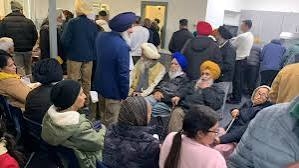Pfizer's (PFE.N) Covid-19 vaccine generates antibody responses three-and-a-half times larger in older people when a second dose is delayed to 12 weeks after the first, a British study said. The study released on Friday is the first to directly compare immune responses of the Pfizer shot from the three-week dosing interval tested in clinical trials, and the extended 12-week interval that British officials recommend in order to give more vulnerable people at least some protection quickly. After Britain moved to extend the interval between doses, Pfizer and vaccine partner BioNTech said there was no data to back up the move. However, Pfizer has said that public health considerations outside of the clinical trials might be taken into consideration.
Pfizer's (PFE.N) Covid-19 vaccine generates antibody responses three-and-a-half times larger in older people when a second dose is delayed to 12 weeks after the first, a British study said. The study released on Friday is the first to directly compare immune responses of the Pfizer shot from the three-week dosing interval tested in clinical trials, and the extended 12-week interval that British officials recommend in order to give more vulnerable people at least some protection quickly. After Britain moved to extend the interval between doses, Pfizer and vaccine partner BioNTech said there was no data to back up the move. However, Pfizer has said that public health considerations outside of the clinical trials might be taken into consideration.








2.jpeg)















